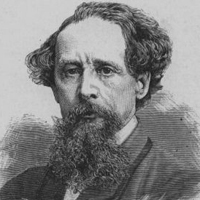Use of Irony and Satire in Dickens's Hard Times
Dickens presents himself as a satirist in Hard Times using powerful irony, bitter sarcasm, and ridiculous languages in various situations. Satire and irony have in general a moral and corrective purpose. His satire is against certain evils, abuses and false value of Victorian society.

Charles Dickens
He primarily focuses on the utilitarianism in education, in business, in industry, and even in the issue of marriage, materialism snobbery and hypocrisy. All these evils have been satirized in the person of Gradgrind, Bounderby, Sparsit, Harthouse, Bitzer, Tom and Slackbridge.
The first time Gradgrind is introduced to us, he is explaining the theory of utilitarian to the new schoolmaster which only concentrates on fact. The way his physical appearance like his hair, eyes, forehead, mouth is described is quite ironic. The pupils of the school are described as empty little vessels, arranged in order, ready to receive gallons and gallons of facts until they are full to the brim. Gradgrind is described as a man of realities, fact and calculation. And wherever he goes, he is ready with instruments to weigh and measure any parcel of human nature.
The irony is sufficiently found at the scene when Gradgrind and a government officer ask questions to the school children and the answer that they give to them to enlighten. The way Bitzer is described is also satirical. The satire in the manner of Gradgrind’s upbringing children is noteworthy. The children are made to lead a pathetic colorless life at home. They are not allowed to wander at fancy and see the face of the moon. No child rhyme and stories were told to them to make them sleep. Ironically the author called them ‘metallurgical Louisa’, and ‘mathematical Tom’. When Sissy is addressed as “girl number twenty” not even by her real name, then the factual education and satire upon it can be easily felt.
When the marriage proposal of Bounderby is discussed the author ridicules the absurd utilitarian education which has turned Louisa into an emotion and tasteless girl. Her parents fail to see the irony when Louisa says to him that he has trained her so well that she never dreamed a child’s dream. Bounderby receives even sharper satire. His physical presence is described in a humorous way, in addition to this, his bragging of his humble birth is ridiculed by the author time and again.
Bounderby not only lauded his own success, but also made others to praise him and his deeds. He is referred to as meeting as the Union Jack, Magna Carta, Royal arms etc. which is obviously amusing and satirical. He is the object of ridicule when he says that the only improvement remaining to be carried out in the conditions of work is to spread Turkey Carpets on the floors of the factory, when he refers to factory smoke as “meat and drink” and the healthiest thing in the world.
Mrs. Sparsit is satirized for her snobbery, hypocrisy and deceitfulness. She springs to her employer Bounderby, with whom she has become dependent after having fallen upon evil days, though she never fails to explain her aristocratic link to others even in slightest opportunity. We are made amused by her weakness for sweet bread and by her references to her “annual compliment”. She thought herself “Bank Fairy” whereas the townspeople regarded her as “Bank dragon” keeping watch over the Bank treasure.
Another important character Bitzer has become the target of satire on the Gradgrind’s theory of education. The author ironically describes him as clear headed, cautions, prudent young man who is sure rise in the world. Bitzer has no affection and passion. When he refuses to let Tom go, he defends his action with reference to the theory of self interest which was taught him in Gradgrind’s school. There is supreme irony in this situation.
Reading on Hard Times
Characterization in Hard Times
Characterization of Mr. Gradgrind
Victorian Society in Hard Times
Industrial Ugliness and Capitalistic Greed in Hard Times
 |
bachelorandmaster.com |